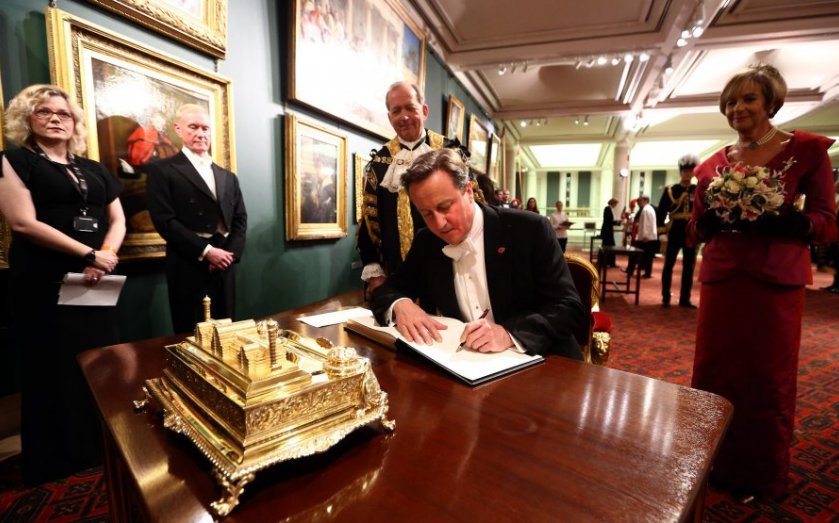“Dear Donald”: A Letter from David Cameron
With a lighthearted and friendly “Dear Donald,” the U.K. government, under Prime Minister David Cameron, sent a letter to President of the European Council Donald Tusk demanding a radical readjustment between the EU and the United Kingdom. Like a bad breakup, the letter sets out four distinct things that must change before going into the much promised “in-out” referendum in Great Britain. This referendum, a political promise made by Cameron’s conservative party while he was taking office, will decide the fate of the U.K.’s membership within the EU. Polls indicate that 48 percent of U.K. citizens would vote in favor of leaving the EU, but that number drops to 36 percent if the government can renegotiate the U.K.’s position within the EU. In light of these statistics, this letter seems less like a bad breakup, and more like an attempt to fix a faltering relationship. What then are the chances that Cameron’s proposals will become reality, and what does this mean for the future of the EU as a whole?
The first of the letter’s four demands is that the EU recognize the eurozone as a multi-currency union with added autonomy for national banks and those nine EU members who do not use the euro. Although the letter denies that the U.K. wants to obstruct eurozone members from making monetary decisions, it appears to want to reserve the right to certain privileges and powers separate from other eurozone members. Chancellor of the Exchequer George Osbourne seemed to confirm this interpretation in an address to business leaders in Berlin. Osbourne said: “We must never let taxpayers in countries that are not in the euro bear the cost for supporting countries in the eurozone.” The second demand follows the main points of the first, but asks that the EU cut down on burdens to business and increase EU competitiveness. This point has been supported by many nations and their leaders, including German Chancellor Angela Merkel, who acknowledged a need for increased EU competitiveness. This point seems unlikely to raise many problems for the U.K. government, and will likely be an easy victory for their cause.
The third and fourth points of Cameron’s agenda strike at the very heart of European integration, asking for increased sovereignty of national legislatures, the ending of Britain’s so-called responsibility to work towards an “ever closer union,” and, most controversially, welfare restrictions for those immigrating to Britain from the EU. The obligation of the U.K. to work towards an “ever closer union” is a founding principle of the EU. Some see the demand that this obligation be removed as an attempt by Cameron to appeal to eurosceptics in his own country. It also appears to be a moot point, as the EU has already acknowledged that an “ever closer union” can mean different things for different nations. Cameron’s most difficult demand calls for restrictions on immigration, namely the ability of the U.K. to restrict welfare for EU immigrants for a period of four years. This is a point that Cameron seems to concede himself, signaling that he may be willing to look at different options. Indeed, almost immediately after the release of the letter, Spokesman for the European Commission Margaritis Schinas called the plan close to “direct discrimination.” The issues of sovereignty and immigration strike at the very core of European integration and open borders. Principles that may be hard to overcome if Cameron’s proposals are going to pass.
Some of Cameron’s points violate the principles of the EU, such as his desire to limit immigration and integration. However, that does not mean that all of his points should be ignored. Most of Cameron’s proposals seem to be supported by other leaders within the EU, including Merkel. Where Cameron will find difficulty is in his call to change immigration policies, as well as his leaning away from the promise of an “ever closer union.” In October, the leading party in the European Parliament, the European People’s Party, recommitted to the founding ideal of an “ever closer union.” Merkel has called the idea of free movement a key principle of the EU.
Despite these impediments, political considerations will most likely win out, and a renegotiation will occur between the U.K. and EU. In fact, Cameron’s attempts to reform the EU in his vision may be just what the Union needs. Euroscepticism has risen steadily within the EU; the consensus is that the EU needs to change. Cameron’s proposals may be a new way forward for the EU, where national differences are recognized while fraternal bonds between members are maintained. This renegotiation Cameron has sparked should not be viewed as a defeat of European principles, but rather as an opportune chance to revitalize them.

